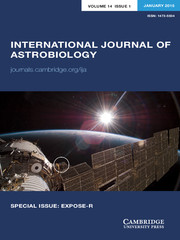One of the greatest enigmas of the Universe is the existence and emergence of life. How could something living arise from something non-living? Where is the dividing line between chemistry and biology, between the abiotic and the biotic, or is there any? And what is ‘life’ in the first place? The question of abiogenesis – the origin of life – is one of the greatest challenges for contemporary astrobiology. How did the first self-replicating molecules come into existence? What necessary geophysical and chemical conditions are needed in order for something alive to emerge out of non-living matter? And how did evolution kick off and lead to an increasing complexity of life?
But the question of the origin of life is not only, strictly speaking, a scientific question: it is also an existential question, a challenge for the human conceptualization of the world, a historical and philosophical question. Humans have, as far as we can trace it, been wondering about the origin of life, about our own nascence. We know it from various creation myths that seem to be mandatory ingredients in all religions, and that range from the Babylonian creation epic Enuma Elish to the Theogony of Hesiod, including also the Mosaic creation myth and many others. Through the ages, philosophers and scientists – often the same scholars – have been discussing and debating the question from various philosophical and scientific standpoints and with a wide range of arguments. In the 17th and 18th centuries, microscopists observed that insects, maggots and other microorganisms seemed to spontaneously arise from dead matter, and elaborated the ancient hypothesis of spontaneous generation. In the 19th century the panspermia hypothesis was becoming a possible solution to the question regarding the existence of life on the Earth, microbial life as distributed by asteroids and meteoroids. During the 20th century, scientists, and in particular biochemists, molecular biologists and microbiologists, got new tools for studying and understanding ‘life’ at the molecular level, for instance by investigating the role of such macromolecules as DNA and RNA, the building blocks of life, while also conducting new experiments – for example the famous Miller–Urey experiment – or performing an increasing number of studies of extremophiles, of life that can survive and thrive in extreme environments. All these investigations also received numerous inputs from other sciences, for instance from planetology, geology or micropaleontology, that contributed to framing the question of the origin of life in terms of plausible historical and environmental settings. All these ideas of collaborating human beings in the history of science have let us come closer to a tentative solution of the enigma of the origin of life. But still it is an unsolved problem.
The history of human conceptions of the origin of life raises a number of historical research questions. When, how and why does a new research field emerge? How have new instruments and methods been used? How are scientific theories and explanations developed and established? How is such an emerging research field organized, with laboratories, journals, conferences, etc., and how does it interact with the surrounding society? The origin of life is also a deep philosophical question that has to do with the very nature of life that resonates with our own existence. It raises, in turn, numerous questions that pertain to the philosophy of science, for instance how we categorize, conceptualize, develop and justify scientific theories. Perhaps, the most debated philosophical problem within astrobiology concerns the very definition of ‘life’. If we are searching for life out there in space, we should at least have some idea about how we can distinguish living from non-living, and what constitutes a habitable environment. It is also a question of establishing ethical guidelines for science. If terrestrial life, or life of another origin, can survive in outer space, we need to find ways of avoiding mutual contamination, in order to avoid scientific misjudgments, and also, perhaps, to protect our very own existence.
In this special issue on the history and philosophy of the origin of life, we have gathered a set of articles that address some of these historical and philosophical questions. The papers were originally presented at ‘The Second International Conference on the History and Philosophy of Astrobiology: The Origin of Life’ held in Höör, Sweden, 8–10 May 2015. The conference was arranged by the European multidisciplinary COST project ‘ORIGINS: Origins and Evolution of Life on Earth and in the Universe’ (TD1308) and its working group ‘History and Philosophy of Astrobiology’, together with the Nordic Network of Astrobiology. Due to the fact that astrobiology and research on abiogenesis are under strong and rapid progress, it is, we believe, an eligible and vital task to study their historical and philosophical context and the very foundations of these scientific endeavours. If we, one day, will arrive at a plausible answer to the enigma of the origin of life, then, that very discovery will for ever change our own conception of the nature of life and, very certainly as well of what it is to be human living beings.

